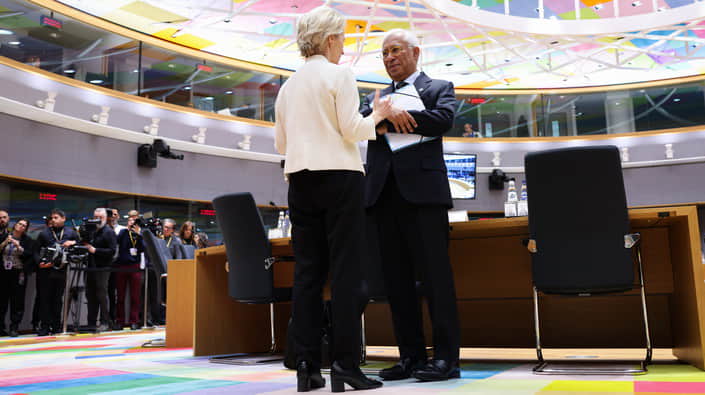A safeguard against the next invasion: why Europe must transfer to Ukraine Russia’s assets

Europe is gradually coming to understand a simple truth: In the face of both external and internal threats, unity is essential. Today, it is not only a matter of security but of the future world order. If democracies are to survive in an increasingly aggressive and multipolar world, they cannot afford weakness.
One of the key decisions democracies need to make is about the transfer of Russia’s frozen sovereign assets.
These are needed to support Ukrainian and European defence, as well as for reconstruction and compensation for the victims of Russian aggression.
This is not just yet another sanction or tool of economic pressure. It is a matter of security, justice and punishment for crime committed.
It is about restoring an international order based on law, where aggressors do not go unpunished.
The Russian Federation has killed tens of thousands of Ukrainians, inflicted over a trillion euros of damage by destroying cities, infrastructure and the environment and forced millions to flee their homes.
Can the world allow a criminal state to keep its financial assets? Clearly, no. Transferring Russian assets to Ukraine is the logical culmination of the sanctions policy and a mechanism for restoring justice.
This would not merely be compensation for Ukraine. It would be a demonstration of European agency and readiness to defend itself.
These resources could be directed toward purchasing European weapons for Ukraine and funding Ukraine’s defence industry. More than that, it would send a clear message to all potential aggressors.
Your actions come with a price. Aggression has real consequences, not just words of concern.
Let’s imagine a scenario: A maniac systematically rapes and kills his neighbours. If he evades justice for years, he will continue committing these crimes. If a criminal faces no real consequences, no prosecution and no transferring of his assets he understands that he can continue to commit crimes with impunity. He can continue to rape and kill.
Russia is a systemic violator of international law. If it is allowed to evade responsibility and retain its assets, this will set a dangerous precedent.
Any state aspiring to aggression will know that it can act without fear of real punishment.
Transferring these assets would change that logic. It would proves that international law actually carries weight and that aggression brings not only political but also economic consequences.
Europe cannot afford the risk of another invasion.
Even if the probability of an attack on another country seems low today, (although Russia is already preparing for new conquests,) Europe cannot take that risk. We have no right to expose our societies to it. That means that the aggressor must be stopped now and not with appeasement but with decisive action.
European countries have all the necessary tools at their disposal to deter such threats and one of the most effective is economic pressure. The Kremlin does not respond to diplomatic statements or deep concern. It only understands real action.
Importantly, such actions would not only punish Russia but also strengthen Europe. Russian assets could be used not just to rebuild Ukraine, but also to boost the continent’s overall defence capability. This would allow Europe to:
- Invest in the modernisation of European armies and defence infrastructure.
- Support the production of advanced weaponry and technologies.
- Strengthen European energy independence.
Our strategic European partners can play a crucial role in this process. Defence companies such as Airbus, BAE Systems, Leonardo, MBDA, Rheinmetall, SAAB, and the Thales Group would gain new opportunities to develop innovative solutions that would make all of Europe more secure.
Europe is gradually beginning to recognise that Russia must face real consequences for its aggression. This is not only the position of politicians but a reflection of the will of European voters as embodied in the European Parliament resolution of 11.03.2025.
This states that Russian sovereign assets frozen under EU sanctions should be transferred to Ukraine and directed toward Ukraine’s defence and reconstruction. This reinforces a series of similar resolutions by the Parliamentary Assembly of the Council of Europe.
Support for the transfer of assets to Ukraine is growing among European leaders: Polish Prime Minister Donald Tusk, Lithuanian Foreign Minister Kstutis Budrys, Estonian Foreign Minister Margus Tsahkna, Estonian President Alar Karis, Spanish Prime Minister Pedro Sanchez and the High Representative of the EU for Foreign Affairs Kaja Kallas, all endorse the idea.
Until recently, Germany, France, and Belgium were opposed, but in March, the French Parliament adopted a resolution in support of Ukraine, calling for the transfer of frozen Russian assets.
Now the decision lies with governments in Berlin and Paris and the European Commission.
Transferring Russian assets would be not just an economic decision but a test of the West’s resolve to defend its own principles. If international law is to function, it must involve punishment for those who violate it.
Europe can no longer afford the luxury of lethargy. Every single day of inaction is paid for in Ukrainian lives and resources.
The question then is not "should we act?" but "how?"
The time for words has passed. Now is the time for action.